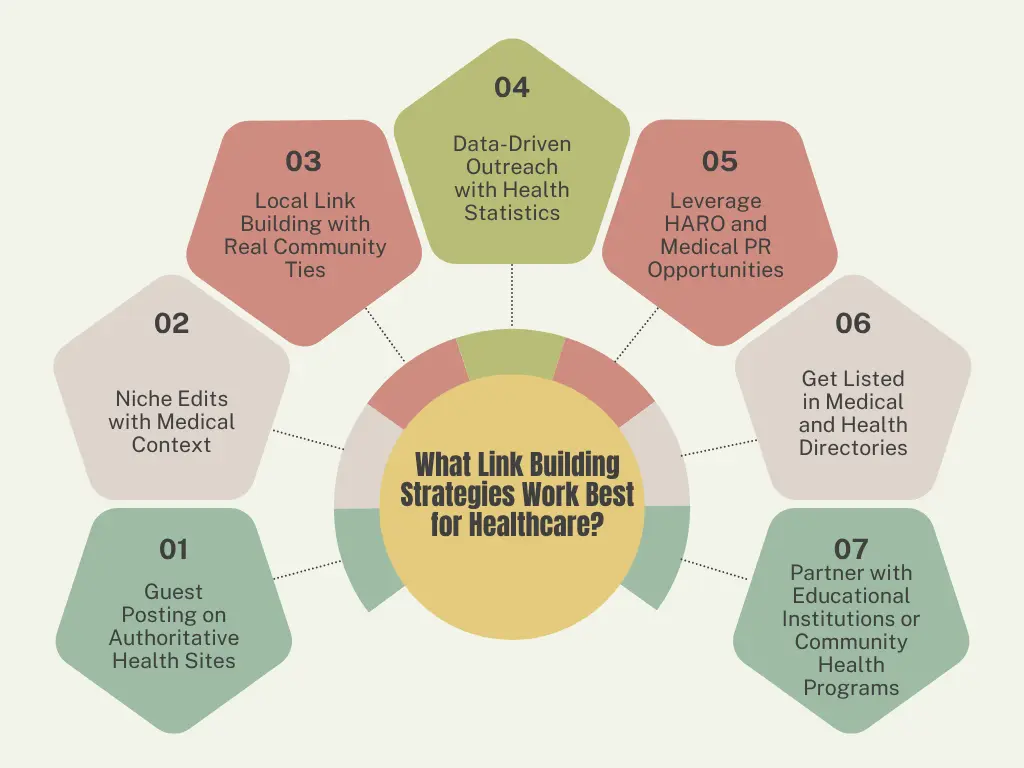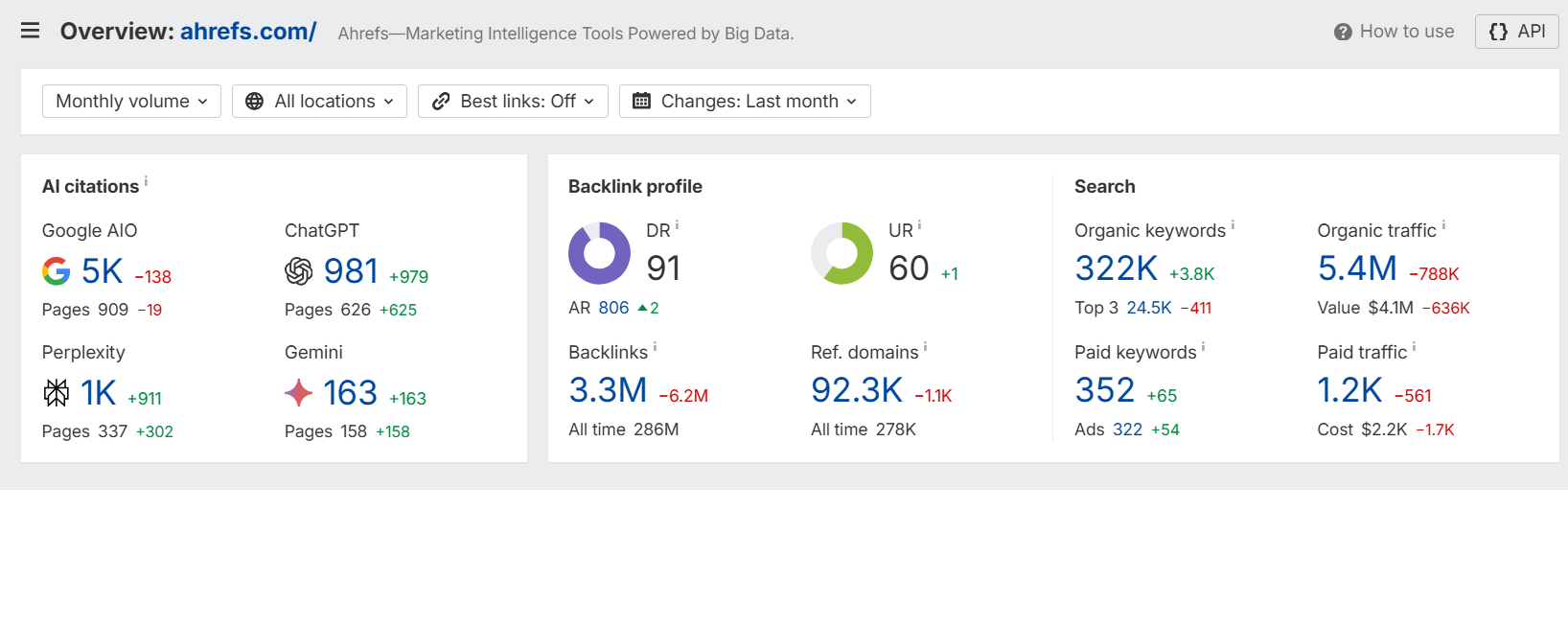
In healthcare SEO, backlinks aren’t just ranking signals; they’re trust signals. Your site competes in a high-stakes, regulated space where credibility is everything. Google’s algorithm applies stricter scrutiny to medical content, rewarding websites that show clear evidence of authority and accuracy. Earning high-quality backlinks from relevant, reputable sources does more than improve visibility; it validates your expertise.
But careless link-building can backfire, damaging both rankings and trust in your hospital site or medical practice. In this field, every backlink must reinforce your medical authority, or risk eroding it.
Link building in healthcare is different because trust is everything. Google treats health content as YMYL, “Your Money, Your Life”, meaning your site must show Experience, Expertise, Authoritativeness, and Trustworthiness (E-E-A-T). Without these, no amount of backlinks will help you rank well. Healthcare sites also face HIPAA and other regulations that limit how you can promote your services. This makes precise, honest link building essential.
One important aspect is building a natural link profile, which means earning a healthy mix of dofollow and nofollow links from diverse, authoritative sources. This balance signals authenticity to search engines and prevents penalties.
Don’t jump straight into outreach. First, run a thorough technical SEO audit to fix site speed, security, and indexing issues. Local SEO is important for healthcare providers; ensure your name, address, and phone (NAP) are consistent across directories and that your Google Business Profile is optimized.

Build a strong content hub focused on medically accurate, patient-centered information for others to reference. This also helps maintain content freshness, which search engines favor.
The backbone of your link building is content reviewed by licensed professionals. Pages with expert medical review, complete with author bios and credentials, signal trust. Link out to well-known sources like WHO, CDC, or peer-reviewed journals to reinforce your site’s authority. Use structured data markup, such as MedicalOrganization, Physician, and FAQPage schema, to help search engines better understand your expertise.
Focus on anchor text optimization by ensuring that the text used in backlinks accurately describes the linked page’s content. Overusing exact match anchor text can appear spammy, so aim for variety and natural language.
Healthcare websites require more than just backlinks; they need credibility, trust, and compliance with strict search standards. The most effective strategies combine authority, relevance, and genuine value.

Each tactic should reflect your expertise while aligning with what both users and search engines look for in trustworthy health content. Here are the effective strategies for healthcare link building:
Pitch original, data-backed articles to reputable health websites and educational platforms. Focus on addressing common patient questions or recent advances in treatments. For instance, a local clinic increased referral traffic by 30% after contributing to a respected medical blog. These backlinks contribute to your site’s page authority (PA) and transfer valuable link equity (or link juice).
Find outdated or thin medical blog posts and offer to add accurate, updated information linking to your resources. This approach builds relevance and strengthens your domain authority. Pay attention to referring domains, the number of unique websites linking to you, as having many high-quality referring domains improves your ranking potential.
Form genuine partnerships with local nonprofits, healthcare alliances, and media outlets. Sponsorships or community health event participation can earn valuable backlinks and local citations, helping you appear in relevant local searches.
Create or curate unique studies or patient survey data. Pitch these exclusive insights to health reporters and bloggers who regularly use statistics in their content. This encourages cocitation, when your site and other authoritative sites are cited together, strengthening your authority by association.
Sign up for HARO (Help a Reporter Out), a popular platform where journalists and bloggers post requests for expert insights and quotes on various topics, including healthcare. By responding promptly with accurate, well-informed answers, you increase your chances of being featured in news articles, interviews, or blog posts.
For example, according to Souloftherapy, a private practice therapist specializing in mental health services, they leveraged HARO to enhance their online presence. By responding to relevant media queries with insightful and timely information, the therapist was featured in articles on reputable platforms such as Psychology Today and Healthline.
These features not only provided valuable backlinks but also positioned the therapist as a credible authority in their field, leading to increased website traffic and client inquiries.
Completing profiles on trusted directories like Healthgrades and WebMD provides quality backlinks that boost your site’s authority. These listings also improve your credibility by displaying your credentials and patient reviews, helping potential patients find and trust your practice more easily.
Collaborate on webinars, research, or awareness campaigns with universities or health programs. Links from .edu or .org domains carry strong authority and improve your site’s trustworthiness.
Save effort by analyzing where your competitors earn backlinks. Tools like Ahrefs’ Link Intersect or SEMrush’s Backlink Gap show you sites linking to multiple competitors but not your site. These pre-qualified domains are more likely to accept your outreach, helping you gain valuable, relevant backlinks faster.
Keep an eye on link velocity, the speed at which you gain backlinks. Building links too quickly can look suspicious to search engines, while being too slow might limit your progress. Aim for a steady, natural pace.
If you’re unsure where to begin or are facing challenges with your healthcare link-building strategy, our team at WhiteLinkBuilding.com is here to support you. We specialize in helping healthcare professionals build strong, ethical backlink profiles that align with industry standards and Google’s guidelines. Whether you need expert guidance or a fully managed solution, we’re ready to provide clear direction and customized support to strengthen your online presence and build lasting trust with your audience.
Track your progress with SEO tools such as Ahrefs, SEMrush, or Google Search Console. Monitor your domain rating, referring domains, backlink quality, and organic traffic. Pay special attention to key medical service pages and the referral traffic generated by your new backlinks. Use internal linking within your site to distribute link equity effectively, helping important pages rank higher.
 What Pitfalls to Avoid in Healthcare Link Building
What Pitfalls to Avoid in Healthcare Link BuildingAvoid buying links or using irrelevant guest posts, they can harm your site’s reputation and rankings. Steer clear of low-quality directories and automated outreach. Always respect HIPAA and privacy laws when using patient testimonials or case studies. Focus on quality and relevance rather than shortcuts.
Aim for backlink diversity by earning links from different types of sites and varied content formats. This strengthens your link profile and helps with topical relevance, signaling to Google that your site is a trusted authority within the healthcare niche.
Effective link-building in healthcare isn’t just about improving rankings, it’s about earning trust, authority, and lasting visibility. Prioritizing quality, relevance, and strategy will keep your website aligned with Google’s standards and patients’ expectations. Invest in ethical, proven practices to build a digital presence that reflects the credibility of your care.
Ready to strengthen your online authority with ethical, results-driven link-building? Connect with the experts at WhiteLinkBuilding.com for customized strategies that elevate your healthcare brand and deliver lasting SEO impact.
Why is link building more sensitive for healthcare websites than other industries?
Because healthcare content falls under Google’s YMYL (Your Money, Your Life) category, it faces stricter evaluation. Every backlink must reflect trust, expertise, and compliance. A poor-quality link could not only hurt rankings but also damage your medical site’s credibility, especially in a field where lives and legal standards are involved.
Can directories like Healthgrades and WebMD improve SEO?
Yes, getting listed on trusted medical directories like Healthgrades, WebMD, and Zocdoc provides high-authority backlinks and boosts your visibility in search results. These profiles often rank independently and show your credentials, reviews, and contact info, reinforcing your site’s legitimacy while driving qualified patient traffic.
What’s the safest way to scale healthcare backlinks without risking penalties?
The safest route is to focus on content quality, trusted sources, and steady growth. Avoid mass link buying or irrelevant posts. Instead, prioritize expert-reviewed content, outreach to reputable sites, and diverse anchor text. Use tools like Ahrefs or SEMrush to track link velocity and make sure your growth looks natural.